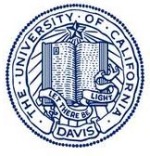So you want to get a PhD at UC Davis
As a faculty member in University of California, Davis's Center for Environmental Policy and Behavior (CEPB), I welcome inquiries from prospective PhD students* interested in studying topics including (but not limited to) bureaucratic behavior; climate change; common-pool resources; ecosystem valuation; federalism in natural resources management; hydraulic fracturing policy; local government environmental policymaking; institutional analysis; environmental policy adoption, diffusion, and implementation; the use of scientific information in policy decision-making; and wetland management.
Joining the CEPB at UC Davis means embarking on a research-focused degree program wherein you will immediately begin tackling important, unanswered questions about environmental policy decision-making and the interface between science and policy. You will collaborate early and often with CEPB-affiliated faculty and students, and you will gain an extensive set of research skills that will equip you to work in academia or to analyze and solve policy puzzles while employed in the public or private sectors.
*The CEBP rarely accepts master's students. We are focused on training doctoral students. You do not need a master's degree to apply for graduate study at UC Davis. We accept many students into the CEPB who have an undergraduate degree and relevant experience.
Training in the CEPB and at UC Davis
In the early stages of your graduate studies, you will take courses in the social and natural sciences. While you will complete some core requirements (e.g., human ecology, statistics), you also will have access to a wide range of courses taught in many disciplines across campus. You will work with your major professor to tailor your degree program to your research priorities. A sample of courses recently taken by students in the CEPB includes courses in agent-based modeling, anthropology, complex social-ecological systems, econometrics, game theory, social choice theory, social network analysis, participatory action research, public policy analysis, public policy theory, and quantitative geography.
While pursuing your coursework, you generally will work as a research assistant on an ongoing CEPB project, under the direction of myself, Dr. Mark Lubell, another CEPB-affiliated faculty member, a postdoc, or senior graduate student. This experience will help you understand the requirements of a scholarly research project and ideally will inform your thinking regarding your dissertation topic. Your coursework and early research experiences should help you pinpoint interesting, unanswered research questions that you can pursue within the context of an existing CEPB project or independently. You will learn and deploy a variety of methodologies to explore your research questions, including (but not limited to) statistical modeling, experiments in the lab or the field, qualitative fieldwork (i.e., interviews and participant observation), surveys, social network analysis, institutional analysis, and more. CEPB faculty will work closely with you to help you develop fellowship and grant proposals to secure funding for your dissertation research. Your dissertation will take the form of three topically and/or methodologically related academic journal articles, which must be submitted or published in order for you to graduate.
What do you do with a PhD from UC Davis?
The rigorous training you will receive in social and natural science methodology provides many professional benefits. If you are interested in going into academia, you will have opportunities in political science, anthropology, geography, and interdisciplinary departments. If you are interested in applied work, you will have a strong set of research skills that will benefit any government or non-profit organization.
Logistics
First, think carefully about whether you want to pursue a PhD, at UCD or anywhere else. There are enormous upsides to getting and using a PhD, but also large challenges. You may have considered some of these issues, but perhaps not all; I personally knew very little about academia before jumping into my PhD program. Find people who have PhDs and ask them about their experiences. If you can, talk both with people who have entered academia and those who work in other sectors; this will expose you to the range of options you can pursue with this degree, and the pluses and minuses of different career paths. Internet research can also be helpful. I recommend starting here:
Some Lesser-Known Truths About Academe
Assuming that you've decided that, yes, you want a PhD, and, yes, UC Davis would be a great fit . . . your next step is to learn about Davis's graduate group system. Students enter the CEPB by applying to one of the many graduate groups at UC Davis. I am affiliated with the Graduate Group in Ecology (GGE), the Graduate Group in Geography (GGG), and the Transportion, Technology, and Policy (TTP) Graduate Group. Some students also enter the CEPB through other graduate groups or departments, such as the Department of Anthropology, Hydrological Sciences, and the Department of Political Science. If you are interested in working with me, you would apply to join GGE, GGG, or TTP and indicate that you would like to have me as your major professor. As a member of these groups and the CEPB, you will have access to mentorship and training from a diverse group of world-class faculty in the Department of Environmental Science and Policy and across the UC Davis campus.
The UC Davis graduate program is noted for giving social scientists a thorough grounding in natural science principles. At the CEPB, we believe this foundation is critical: To understand environmental problems, you must understand environmental science and you must be able to bridge the divide between natural scientists and policy decisionmakers. The UC Davis emphasis on natural science underpinnings sets our program apart from other public affairs and public policy PhD programs. This is a difference about which you should be aware when you consider where you want to pursue your doctoral studies.
Since many of the CEPB students enter through the GGE, the following advice is specific to that graduate group. To be a competitive GGE applicant, you need to have completed (as an undergraduate or in other post-graduate coursework) an introductory course in general ecology. When applying to the GGE, it is helpful, though not entirely necessary, for you also to have completed coursework in biology, calculus, chemistry, economics, physics, and statistics. If you have deficiencies in some of these areas but are a strong candidate otherwise, you can be admitted with the stipulation that you complete courses in these areas early in your graduate studies. A complete list of the GGE requirements is available here, and TTP requirements are detailed here.
To be a very strong candidate for GGE admission and funding, you generally should have an undergraduate GPA over 3.5 and verbal and quantitative GRE scores above the 85th percentile. These are not university requirements or standards. Rather, they are thresholds above which we have generally observed prospective students successfully competing for admission and funding.
Next steps
If you are interested in joining the CEPB and working with me, please send me an email (gbarnold@ucdavis.edu) detailing your educational background, professional experience, and research interests. The CEPB is designed to facilitate research collaboration among students and between students and faculty. Thus, you should be very specific about your research interests so that I can assess whether you would be a good fit for our group. Please make sure to indicate your undergraduate GPA and your GRE scores and percentiles. Students who have not contacted myself or Dr. Mark Lubell (mnlubell@ucdavis.edu) before the application review period will not be accepted. If you do not have a master's degree, you also should prepare an application for the National Science Foundation's Graduate Research Fellowship Program (NSF GRFP). The GRFP is a generous fellowship that can support three years of doctoral study, and we require that eligible prospective CEPB students apply for it.
Deadlines
For the schedule of deadlines applicable to the GGE, GGG, and TTP, as well as other graduate groups, please consult this chart. Prospective students should apply by the priority deadlines, which usually fall in December. The deadline for applying to the NSF GRFP for social sciences is generally in November.


